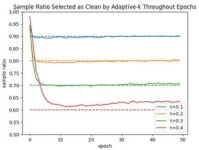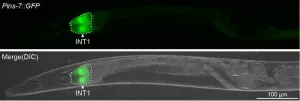(Press-News.org) University of Queensland researchers have discovered a mechanism in DNA that regulates how disease-causing mutations are inherited.
Dr Anne Hahn and Associate Professor Steven Zuryn from UQ’s Queensland Brain Institute said the findings could provide a promising therapeutic avenue to stop the onset of heritable and age-related diseases.
“Mitochondrial DNA is essential for cell function,” Dr Hahn said.
“But as we age it mutates, contributing to diseases like dementia, cancer and diabetes.
“Our team identified 2 enzymes that regulate a chemical modification – adenine methylation or 6mA – in mitochondrial DNA across various species, including humans.”
“Removing this modification leads to uncontrolled accumulation and inheritance of mutations in the DNA,” Dr Hahn said.
“Our study shows the 6mA modification controls these mutations, suggesting that enhancing levels of 6mA could slow disease progression.”
The concept of epigenetics is an evolving field of research that reveals how environmental factors such as childhood experiences, can influence gene expression.
This challenges the old belief that DNA mutations inevitably lead to disease.
Dr Hahn said the study bridges the gap between genetics and epigenetics.
“It shows how this epigenetic mark guards against disease-causing mutations and ensures the continuity of healthy cells,” she said.
Dr Zuryn said epigenetic modification was not only essential for individual health but also for safeguarding the genetic integrity of future generations.
“Our discovery was largely performed in the model organism C. elegans, and cells grown in a laboratory,” he said.
“The team is now exploring whether similar mechanisms exist in humans and how they might influence disease outcomes.
“This research has vast implications and offers a novel perspective on genetic and epigenetic factors in health and disease.”
The research paper has been published in Cell Metabolism.
Media contact
QBI Communications
communications@qbi.uq.edu.au
Merrett Pye +61 422 096 049
END
The changes to cell DNA that could revolutionise disease prevention
University of Queensland researchers have discovered a mechanism in DNA that regulates how disease-causing mutations are inherited.
2024-08-22
ELSE PRESS RELEASES FROM THIS DATE:
Gut molecule slows fat burning during fasting
2024-08-22
LA JOLLA, CA—In a struggle that probably sounds familiar to dieters everywhere, the less a Caenorhabditis elegans (C. elegans) worm eats, the more slowly it loses fat. Now, scientists at Scripps Research have discovered why: a small molecule produced by the worms’ intestines during fasting travels to the brain to block a fat-burning signal during this time.
Although the exact molecule they identified in the worms has not yet been studied in humans, the new work helps scientists better ...
The Lancet Public Health: Climate change and ageing populations to drive greater disparities in deaths from hot and cold temperatures across Europe, modelling study suggests
2024-08-22
Modelling study using data on 854 European cities is the first to estimate current and future deaths from hot and cold temperatures at this level of regional detail for the entire continent.
Study suggests existing regional disparities in death risk from hot and cold temperatures among adults will widen in the future due to climate change and ageing populations.
A slight decline in cold-related deaths is projected by 2100, while deaths from heat will increase in all parts of Europe, most significantly in southern regions. Areas worst affected will include Spain, Italy, Greece and parts of France.
Currently, around eight times ...
Suicide rates among doctors have declined, but female doctors still at high risk
2024-08-22
Suicide rates among doctors have declined over time, but are still significantly higher for female doctors compared with the general population, finds an analysis of evidence from 20 countries published by The BMJ today.
The researchers acknowledge that physician suicide risk varies across different countries and regions, but say the results highlight the ongoing need for continued research and prevention efforts, particularly among female physicians.
According to some estimates, one doctor dies by suicide every day in the US, and ...
New study provides further support for psilocybin’s potential to treat depressive symptoms
2024-08-22
High doses of psilocybin - the active ingredient in magic mushrooms - appears to have a similar effect on depressive symptoms as the selective serotonin reuptake inhibitor (SSRI) drug escitalopram, suggests a systematic review and meta-analysis published in The BMJ today.
The findings show that patients treated with high dose psilocybin showed better responses than those treated with placebo in antidepressant trials, although the effect size was small.
The researchers point out that flaws in study designs may have overestimated the effectiveness ...
Calls for cold water swimming to be made safer for women
2024-08-22
Cold water swimming is growing in popularity amongst women, but more support is needed to make many wild swimming sites in the UK safer and more accessible, finds a new study led by UCL researchers.
The research, published in Women’s Health, explored the habits of women who enjoy cold water swimming and was carried out in collaboration with researchers from the University of Portsmouth, University of Sussex, University Hospitals Sussex NHS Foundation Trust, University of Plymouth and Bournemouth University.
The team surveyed 1,114 women in the UK aged 16 to 80 years ...
Wounds are common among people who use illicit opioids, but proper wound care is hard to find
2024-08-22
The animal tranquilizer xylazine is increasingly found in the illicit opioid supply nationwide, leading to severe wounds among people who use drugs. New research led by a University of Pittsburgh physician-scientist and published in Drug and Alcohol Dependence seeks to understand wound care experiences of this population.
A cross-sectional survey of people who use drugs identified through three syringe service providers in Massachusetts found the vast majority had experienced xylazine wounds in the prior year. As the need for comprehensive, low barrier wound care grows, access to such care continues to lag behind the demand. As a result, these wounds often lead to serious ...
Even as COVID raged, spikes in homicide were a significant drag on life expectancy for Black men
2024-08-22
MADISON — While the COVID-19 pandemic quickly reversed decades of progress in closing the gap between life expectancies for Black and white people in the United States, the disease’s toll may have obscured the impact of another significant public health concern — a sharp increase in homicide rates — on the life expectancy of Black men, according to researchers at the University of Wisconsin–Madison.
In 2019, Black men in the U.S. were expected to live an average of 71.4 years, ...
MD Anderson receives over $21.4 million in CPRIT funding to support research and launch new core facilities
2024-08-22
HOUSTON ― The University of Texas MD Anderson Cancer Center today was awarded nine grants totaling over $21.4 million from the Cancer Prevention and Research Institute of Texas (CPRIT) in support of two new core facilities, faculty recruitment and groundbreaking cancer research across all areas of the institution.
“We are enormously appreciative of CPRIT’s support of impactful cancer research initiatives at MD Anderson,” said Peter WT Pisters, M.D., president of MD Anderson. “These new core facilities will help advance important areas of research in spatial biology and decision ...
Lehigh University is a core institution of new $26 Million NSF Engineering Research Center
2024-08-21
The U.S. National Science Foundation (NSF) has awarded $26 million to establish a new Gen-4 Engineering Research Center (ERC) named Environmentally Applied Refrigerant Technology Hub (EARTH) to create a sustainable and circular refrigerant economy.
The University of Kansas is the lead institution, joined by partners at Lehigh University, University of Notre Dame, University of Maryland, University of Hawai'i and University of South Dakota. David Vicic, the Howard S. Bunn Distinguished Professor of Chemistry, will lead Lehigh’s team. Mark Shiflett, University of Kansas Foundation Distinguished Professor in the Department of Chemical & Petroleum Engineering, will be the ERC EARTH ...
NJIT biologist awarded $680,000 federal grant to save North Atlantic right whale
2024-08-21
Brooke Flammang, a biologist at New Jersey Institute of Technology (NJIT), has been awarded nearly $680,000 from the National Oceanic and Atmospheric Administration (NOAA) as part of a growing nationwide effort to save the critically endangered North Atlantic right whale (Eubalaena glacialis).
NOAA Fisheries recently unveiled a more than $9 million initiative funded by the Inflation Reduction Act to support a coalition of universities, nonprofits and scientific organizations engaged in the recovery of the species, which has seen its numbers dwindle to roughly 360 individuals ...
LAST 30 PRESS RELEASES:
Scientists discover why we know when to stop scratching an itch
A hidden reason inner ear cells die – and what it means for preventing hearing loss
Researchers discover how tuberculosis bacteria use a “stealth” mechanism to evade the immune system
New microscopy technique lets scientists see cells in unprecedented detail and color
Sometimes less is more: Scientists rethink how to pack medicine into tiny delivery capsules
Scientists build low-cost microscope to study living cells in zero gravity
The Biophysical Journal names Denis V. Titov the 2025 Paper of the Year-Early Career Investigator awardee
Scientists show how your body senses cold—and why menthol feels cool
Scientists deliver new molecule for getting DNA into cells
Study reveals insights about brain regions linked to OCD, informing potential treatments
Does ocean saltiness influence El Niño?
2026 Young Investigators: ONR celebrates new talent tackling warfighter challenges
Genetics help explain who gets the ‘telltale tingle’ from music, art and literature
Many Americans misunderstand medical aid in dying laws
Researchers publish landmark infectious disease study in ‘Science’
New NSF award supports innovative role-playing game approach to strengthening research security in academia
Kumar named to ACMA Emerging Leaders Program for 2026
AI language models could transform aquatic environmental risk assessment
New isotope tools reveal hidden pathways reshaping the global nitrogen cycle
Study reveals how antibiotic structure controls removal from water using biochar
Why chronic pain lasts longer in women: Immune cells offer clues
Toxic exposure creates epigenetic disease risk over 20 generations
More time spent on social media linked to steroid use intentions among boys and men
New study suggests a “kick it while it’s down” approach to cancer treatment could improve cure rates
Milken Institute, Ann Theodore Foundation launch new grant to support clinical trial for potential sarcoidosis treatment
New strategies boost effectiveness of CAR-NK therapy against cancer
Study: Adolescent cannabis use linked to doubling risk of psychotic and bipolar disorders
Invisible harms: drug-related deaths spike after hurricanes and tropical storms
Adolescent cannabis use and risk of psychotic, bipolar, depressive, and anxiety disorders
Anxiety, depression, and care barriers in adults with intellectual and developmental disabilities
[Press-News.org] The changes to cell DNA that could revolutionise disease preventionUniversity of Queensland researchers have discovered a mechanism in DNA that regulates how disease-causing mutations are inherited.




